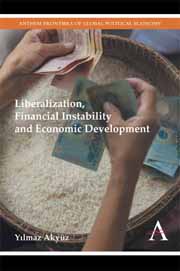Introduction
Summary
Globalization is understood and promoted as absolute freedom for all forms of capital, above all financial capital, while restrictions continue to shape the markets for goods. labor and technology. This has reduced the power of nations to regulate and control their own economic space, shifted the playing field against labor and industry, and led to growing financialization of the world economy. Two important consequences are increased instability and inequality. Moreover, for developing countries (DCs) the benefits of unleashed finance have proved to be highly elusive. It has not only meant loss of crucial policy tools for industrialization and development, but has also exposed them to severe global financial cycles, as seen once again during the recent turmoil originating in the US and Europe. Thus, the belief that DCs have decoupled from the North and become new engines of global growth has turned out to be a myth.
This book urges DCs to be as selective about globalization as advanced economies (AEs), better manage their integration into an inherently unstable international financial system, rebalance domestic and external sources of growth, and manage market forces by strengthening public control. It brings together several papers written since the mid-2000s, except the first one which goes back two decades. It is organized in two parts. Part One examines the impact of financial liberalization on stability and growth in DCs and national, regional and global policy options in reducing instability.
- Type
- Chapter
- Information
- Publisher: Anthem PressPrint publication year: 2014



